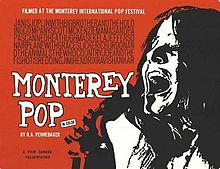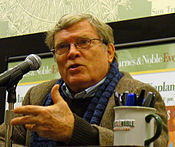- Monterey Pop
-
Monterey Pop 
Monterey Pop movie posterDirected by D. A. Pennebaker Produced by John Phillips
Lou AdlerStarring The Mamas & the Papas
Canned Heat
Simon & Garfunkel
Hugh Masekela
Jefferson Airplane
Big Brother and the Holding Company
The Animals
The Who
Country Joe and the Fish
Otis Redding
The Jimi Hendrix Experience
Ravi ShankarEditing by Nina Schulman Distributed by Leacock Pennebaker Release date(s) December 26, 1968 Running time 79 minutes Country United States Language English Monterey Pop is a 1968 concert film by D. A. Pennebaker that documents the Monterey Pop Festival of 1967. Among Pennebaker's several camera operators were fellow documentarians Richard Leacock and Albert Maysles. The painter Brice Marden has an "assistant camera" credit, and Bob Neuwirth, who figured prominently in Pennebaker's Bob Dylan documentary Dont Look Back, acted as stage manager. Titles for the film were by the illustrator Tomi Ungerer. Featured performers include Big Brother and the Holding Company with Janis Joplin, Jefferson Airplane, Hugh Masekela, Otis Redding, Ravi Shankar, The Mamas & the Papas, The Who and the Jimi Hendrix Experience, whose name-sake set his guitar on fire, broke it on the stage, then threw the neck of his guitar in the crowd at the end of "Wild Thing".
Contents
Performers and songs
Songs featured in the film, in order of appearance:
- Scott McKenzie—"San Francisco (Be Sure to Wear Flowers in Your Hair)"*
- The Mamas & The Papas—"Creeque Alley"* and "California Dreamin'"
- Canned Heat—"Rollin' and Tumblin'"
- Simon & Garfunkel—"The 59th Street Bridge Song (Feelin' Groovy)"
- Hugh Masekela—"Bajabula Bonke (The Healing Song)"
- Jefferson Airplane—"High Flyin' Bird" and "Today"
- Big Brother & The Holding Company—"Ball 'n' Chain"
- Eric Burdon & The Animals—"Paint It, Black"
- The Who—"My Generation"
- Country Joe & The Fish—"Section 43"
- Otis Redding—"Shake" and "I've Been Loving You Too Long"
- The Jimi Hendrix Experience—"Wild Thing"
- The Mamas & The Papas—"Got a Feelin'"
- Ravi Shankar—"Raga Bhimpalasi"
* = Studio version, played over film footage of pre-concert activity.
The order of performances in the film was rearranged from the order of appearance at the festival. Additionally many artists who appeared at the festival were not included in the original cut of the film. (For details on the festival lineup see Monterey Pop Festival.)
DVD
In 2002 Monterey Pop was re-released on DVD as part of a Criterion Collection box set, The Complete Monterey Pop Festival, that also includes Pennebaker's short films Jimi Plays Monterey (1986) and Shake! Otis at Monterey (1986), as well as two hours of outtake performances, including some by bands not seen in the original film.
Influence
Jean-Luc Godard, the French New Wave director, was so taken by Jefferson Airplane's performance in Monterey Pop that later in 1968 he set out to make a never-finished film called One A.M. (for "One American Movie") in collaboration with Pennebaker and Leacock. Godard shot a sequence of the Airplane, (included on the 2004 "Fly Jefferson Airplane" DVD) , playing at high noon on a business day on the roof of a New York hotel across the street from the Leacock-Pennebaker offices, with the tower of Rockefeller Center in the background. Attracted by the extremely high volume of the music, the police arrived and put an end to the shooting. This incident inspired other bands, notably the Beatles in their Let It Be film, to mount their own rooftop performances.
In 1969, Michael Lang and Artie Kornfeld pitched an idea for a recording studio in Woodstock, New York to businessmen John P. Roberts and Joel Rosenman. In the documentary Woodstock: Now and Then, Rosenman states that what really caught his eye in the proposal was the suggestion that the studio would encourage occasional rock concerts in the town. Rosenman had watched Monterey Pop the day before meeting with Lang and Kornfeld and recalled thinking it one of the best films he had ever seen, and was excited about the notion of being part of something similar. Rosenman and Roberts agreed to bankroll Lang and Kornfeld in an effort that morphed into the 1969 Woodstock Festival.
External links
Categories:- 1968 films
- Concert films
- Hippie films
- Films directed by D. A. Pennebaker
- Rockumentaries
Wikimedia Foundation. 2010.

